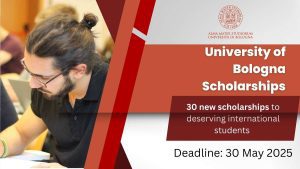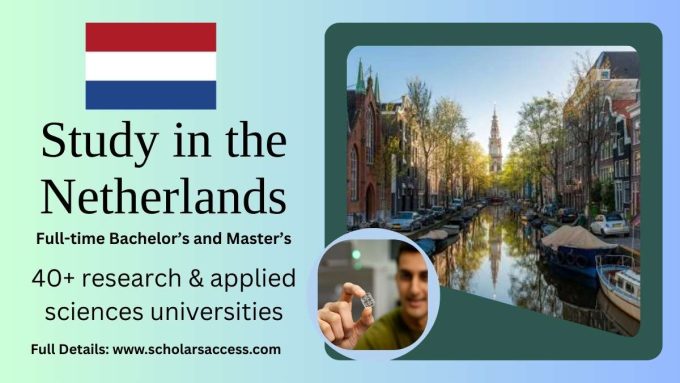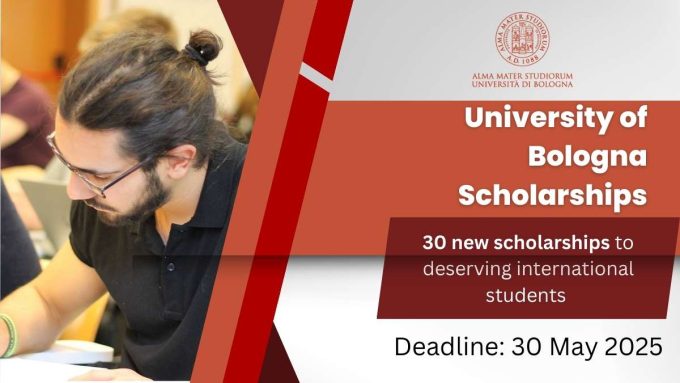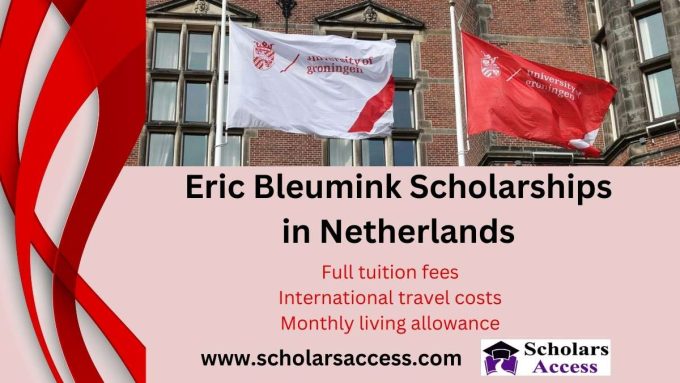Scholarships in the Netherlands offer international students valuable financial support to pursue high-quality education at renowned Dutch institutions. The Netherlands has emerged as a prominent destination for international students seeking high-quality education in a diverse and inclusive environment.
To support this influx of global talent, various scholarships are available to assist students financially. This guide provides an in-depth overview of the primary scholarships offered in the Netherlands, detailing their benefits, eligibility criteria, application processes, and tips for prospective applicants.
NL Scholarship (Formerly Holland Scholarship)
Overview
One of the flagship scholarship programs, the Holland Scholarship is funded by the Dutch Ministry of Education, Culture, and Science and several Dutch research universities and universities of applied sciences. The NL Scholarship, previously known as the Holland Scholarship, is designed for international students from outside the European Economic Area (EEA) who aspire to pursue a bachelor’s or master’s degree in the Netherlands. This initiative is a collaboration between the Dutch Ministry of Education, Culture and Science, and several Dutch research universities and universities of applied sciences.
Benefits
Recipients of the NL Scholarship receive a one-time grant of €5,000, awarded during the first year of study. It’s important to note that this scholarship does not cover full tuition or living expenses; instead, it serves as a financial contribution towards initial costs.
Eligibility Criteria
To be considered for the NL Scholarship, applicants must:
- Hold a non-EEA nationality.
- Apply for a full-time bachelor’s or master’s program at one of the participating Dutch higher education institutions.
- Meet the specific admission requirements of the chosen institution.
- Not have previously obtained a degree from an educational institution in the Netherlands.
Participating Institutions
A variety of Dutch research universities and universities of applied sciences participate in the NL Scholarship program. Some of these institutions include:
- Utrecht University
- University of Groningen
- Erasmus University Rotterdam
- Maastricht University
- VU Amsterdam
- Radboud University
- Delft University of Technology
- Eindhoven University of Technology
- University of Twente
- Wageningen University
For a comprehensive and updated list of participating institutions and their specific deadlines, applicants should consult the official Study in NL website or the respective institution’s website.
Application Process
The application process involves the following steps:
- Select a Program and Institution: Choose a full-time bachelor’s or master’s program at a participating Dutch higher education institution.
- Check Institution-Specific Requirements: Each institution may have additional criteria or application procedures. It’s essential to review these on the institution’s official website.
- Prepare Application Materials: Gather necessary documents, which typically include academic transcripts, a motivation letter, proof of English proficiency, and a curriculum vitae (CV).
- Submit Application: Apply directly to the chosen institution. During the application process, indicate your interest in the NL Scholarship and follow any institution-specific instructions.
- Await Selection Results: The institution will review applications and inform candidates of their scholarship status.
Deadlines
Application deadlines vary by institution but generally fall between February and May for the upcoming academic year. It’s crucial to verify the exact dates on the institution’s website to ensure timely submission.
Orange Tulip Scholarship (OTS)
Overview
Managed by Nuffic, the Dutch organization for internationalization in education, the Orange Tulip Scholarship offers talented students from Neso (Netherlands Education Support Offices) countries the opportunity to study in the Netherlands. These countries include Brazil, China, India, Indonesia, Mexico, Russia, South Africa, South Korea, and Vietnam.
Benefits
The benefits of the OTS vary depending on the agreements with participating Dutch higher education institutions and may cover partial or full tuition fees, living expenses, or other costs.
Eligibility Criteria
Eligibility requirements differ per country and institution but generally include:
- Citizenship of one of the Neso countries.
- Admission to a participating Dutch institution.
- Meeting specific academic and language proficiency requirements set by the institution.
Application Process
- Check Availability: Determine if the OTS is available in your country by consulting the Nuffic Neso office or the Study in NL website.
- Select a Participating Institution and Program: Choose from the list of Dutch institutions participating in the OTS for your country.
- Apply for Admission: Submit an application for your chosen program directly to the institution.
- Apply for the OTS: Follow the application procedures outlined by the Nuffic Neso office in your country, which may include submitting additional documents or forms.
- Await Notification: Successful candidates will be informed by the institution or the Nuffic Neso office.
Deadlines
Deadlines vary by country and institution. It’s advisable to check with the local Nuffic Neso office for specific dates and procedures.
Erasmus Mundus Joint Master Degrees (EMJMD)
Overview
The Erasmus Mundus program, funded by the European Union, aims to enhance quality in higher education through scholarships and academic cooperation between the EU and the rest of the world. EMJMDs are prestigious, integrated, international study programs jointly delivered by an international consortium of higher education institutions.
Benefits
Scholarships for EMJMDs cover participation costs, travel expenses, installation costs, and provide a monthly subsistence allowance for the entire duration of the study program.
Eligibility Criteria
While specific requirements may vary by program, general eligibility includes:
- A first higher education degree or equivalent.
- Meeting the specific academic and language requirements of the EMJMD program.
- Open to students worldwide, regardless of nationality.
Application Process
- Identify EMJMD Programs: Explore the EMJMD catalog on the Erasmus+ website to find programs that align with your interests.
- Review Program Requirements: Each program has its own eligibility criteria and application procedures detailed on its website.
- Prepare Application Materials: Typically includes academic transcripts, a motivation letter, letters of recommendation, proof of language proficiency, and a CV.
- Submit Application: Apply directly to the EMJMD consortium according to the instructions provided.
- Selection and Notification: The consortium evaluates applications and notifies successful candidates.
Deadlines
Application deadlines are program-specific but generally fall between October and January for programs starting the following academic year.
Institutional Scholarships in the Netherlands
Many Dutch higher education institutions offer their own scholarships to attract talented international students. These scholarships may be merit-based, need-based, or targeted at specific fields of study.
Examples
- University of Amsterdam (UvA) Merit Scholarship: Offers scholarships to outstanding students from outside the EU/EEA.
- Leiden University Excellence Scholarship (LExS): Available for excellent non-EEA/non-EFTA students enrolling in a master’s program.
- TU Delft Excellence Scholarships: Includes the Justus & Louise van Effen Scholarship, aimed at international students pursuing an MSc degree at TU Delft.
Application Process
- Research Institutional Scholarships: Visit the official websites of Dutch institutions to explore available scholarships.
- Review Eligibility and Requirements: Each scholarship has specific criteria and required documents.
- Apply for Admission: Submit an application for your chosen program at the institution.
- Apply for the Scholarship: Follow the institution’s procedures for scholarship application, which may be integrated with the program application or require a separate submission.
- Await Decision: Institutions will inform applicants of their scholarship status, typically alongside admission offers.
Deadlines
Deadlines for institutional scholarships vary widely. It’s essential to check the specific dates on the institution’s scholarship webpage.
Why Study in the Netherlands?
Before diving into scholarship opportunities, it’s essential to understand why the Netherlands is a favored destination for international education:
- Globally Recognized Education System: Dutch universities consistently rank among the top institutions worldwide, offering cutting-edge research, interdisciplinary approaches, and innovative teaching methods.
- Wide Range of English-Taught Programs: With over 2,000 programs taught entirely in English, the Netherlands is highly accessible to international students.
- Multicultural Society: The Netherlands is known for its openness and diversity, welcoming students from all over the globe.
- Excellent Career Opportunities: The Dutch labor market is dynamic and internationally connected, offering internships and job opportunities for skilled graduates.
- High Quality of Life: With safe cities, efficient public transport, and a vibrant cultural scene, students enjoy a balanced and enriching lifestyle.
Tips for a Successful Application for Scholarships in the Netherlands
1. Start Early
Most scholarships have early deadlines and involve several steps such as applying for admission, submitting extra documents, and obtaining recommendations. Starting early allows time to gather all materials without stress.
2. Tailor Your Motivation Letter
Make sure your scholarship motivation letter is personalized for each program. Highlight your passion, your academic goals, and how the program aligns with your future aspirations.
3. Showcase Impact
Most scholarships value candidates who intend to make a positive difference in their home countries or globally. Clearly outline how your education in the Netherlands will help you contribute to society.
4. Meet Language Requirements
Most Dutch programs require English proficiency. Prepare for and take standardized tests like IELTS or TOEFL well in advance.
5. Stay Organized
Keep a spreadsheet of scholarships, deadlines, documents needed, and contacts. Organization is key to managing multiple applications.
Other Financial Aids and Cost Considerations
While scholarships are immensely helpful, it’s wise to consider the complete cost of studying in the Netherlands:
- Tuition Fees: Typically €6,000–€20,000 per year for non-EU students.
- Living Costs: Around €900–€1,300 per month (including accommodation, food, transport, etc.).
- Insurance: Health insurance is mandatory; some scholarships cover it.
- Part-Time Work: International students can work up to 16 hours per week during the academic year and full-time during holidays.
Dutch institutions and cities also offer student discounts, affordable housing options, and public transport cards, which can help reduce costs.
Conclusion: Turning Your Dream into Reality
The Netherlands offers an outstanding academic environment supported by a generous network of scholarships and grants. Whether you are a high-achieving student, a working professional, or an aspiring researcher, there’s likely a funding opportunity tailored to your needs.
By understanding the types of scholarships available, adhering to the application processes, and demonstrating both academic potential and societal impact, you can significantly increase your chances of receiving financial support.
Studying in the Netherlands isn’t just an academic journey—it’s a cultural, professional, and personal transformation. With the right scholarship, your Dutch dream is closer than you think.














Leave a comment